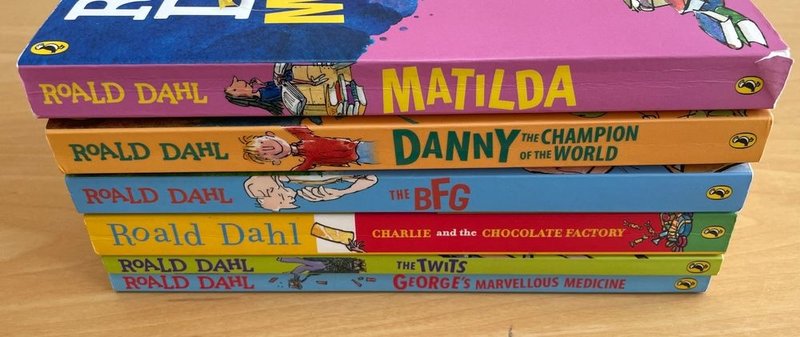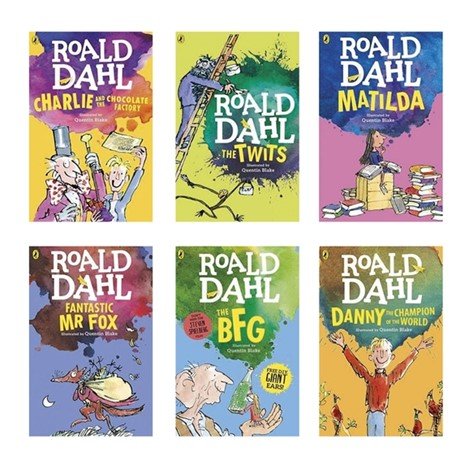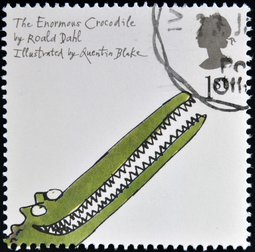
We aim to give food for thought as well as inspiring your creativity and
providing practical ideas you can’t wait to implement in your own settings!
Roald Dahl Day
Will you be marking the day on the 13th September?

Controversy
Firstly, let’s address the ongoing controversy surrounding the editing of classic authors such as Roald Dahl.
One of the things that draws children to authors like Dahl is undoubtably the irreverence and shock value that comes with his stories and poems. There is no ‘softly, softly’ approach. His adults can be the vilest baddies who think nothing of bullying and torturing children. The animals in his poems eat children for lunch or drop cowpats on their heads!
Children generally love this and find the ideas hilarious. It might be seen in a similar light to going on a fairground ride that is slightly scary; they can experience it and know they are safe. Or perhaps more easily compared to darker traditional tales, such as Red Riding Hood, Hansel and Gretel or even the 3 Little Pigs. Children are able to enjoy the stories, and even relish the goriest parts, even if Grandma or two of the pigs are eaten by the wolf!
Many adults seek out (or perhaps edit as they read) early childhood stories, such as the traditional fairy tales, that have been adapted to produce much happier endings not involving death, such as the wolf running away, rather than being turned into a stew, or Red Riding Hood’s granny still being alive after being eaten.
Is it wokeism?
It’s not that anyone is suggesting Dahl’s books should be made completely ‘safe’ or sanitised, but there have certainly been a great many edits to them, and publishers have been accused of ‘wokeism’.
The wider argument involves many ‘classic’ books, and the question is: should books be edited to fit modern times and sensibilities, or should they all be left exactly as the author intended?
As adults, we understand that historical context can play a huge part. Many author’s novels have included racism, for example – Charles Dickens, or Margaret Mitchell who wrote Gone with the Wind to name just two of many. Jane Austen’s novels are full of misogyny of course but were written in the 18th century, so it is acceptable to us in a way that certainly wouldn’t be today.
What do you think? Should some books be allowed to be edited? Is it different when we’re talking about children’s books? Should we change some of the author’s chosen words and phrases because children don’t have the life experience to apply that sort of understanding? Or should we leave well alone and perhaps even use them as an opportunity to talk about how things have changed?
What sorts of edits have been made?
In Charlie and the Chocolate Factory, Augustus Gloop is now described as ‘enormous’ rather than ‘fat’ and the Oompa-Loompas are ‘small people’ rather than ‘small men’. In the first version of the book, the Oompa Loompas were a pygmy African tribe, imported by Willy Wonka from “the very deepest and darkest parts of the African jungle.”
The Witches has had more than 50 changes. One of them includes a new line to explain that although the witches are bald under their wigs, “There are plenty of other reasons why women might wear wigs and there is certainly nothing wrong with that.”
References relating to gender, race, mental health, violence and weight have been edited. The Roald Dahl Story Company and Puffin books carried out the reviews so that the books (in their words) can be “enjoyed by all children”.
Many people have made their views known, including Rishi Sunak and Salman Rushdie. Rushdie called it “absurd censorship” and said the publishers “should be ashamed.”
The Prime Minister put out a statement about how literature should be “preserved and not airbrushed”.
Puffin has come up with a conciliatory solution. Roald Dahl books will be issued in both forms (edited and unedited) so that buyers can choose which version they would like. It would be interesting to know which versions are most popular!

10 Facts about Roald Dahl
✔ Roald Dahl was born on the 13th September 1916 and died on the 23rd November 1990 at 74 years old.
✔ He was born in Wales, to Norwegian parents but spent most of his life in England.
✔ He was named after the Norwegian polar explorer Roald Amundson.
✔ He wrote 48 books in total, including 20 for children.
✔ His books have sold more than 300 million copies worldwide.
✔ He invented over 250 new words, such as scrumdidlyumtious, snozzcumbers and Oompa Loompas.
✔ He did all his writing in pencil.
✔ He was very tall – 6 feet 6 inches (2 metres)
✔ He wrote many of his books in a little shed at the bottom of his garden.
✔ He wrote for around 4 hours every day.
How many of these have you read?
Celebrate Roald Dahl Day in KS2
Children love the irreverence and fun of Roald Dahl’s stories. His books are a great way to encourage the love of reading, especially for reluctant readers. They may have been enthused by one of the films or TV programmes. Most books are not too long either, which can be encouraging for some children, and of course they have the wonderful Quentin Blake illustrations. Here are a few ideas you might like!
✔ Choose a paragraph from a selection of the books to read throughout the day. Can the children say which book it is from? Talk about the language used in the paragraph. Would it encourage children to read the book?
✔ Dress up as Miss Honey and/or Miss Trunchbull from Matilda. If there are two adults in the class, take one character each! Mimic how they are with children. How would Miss Trunchbull or Mis Honey enter the class differently? How would they greet the children?
✔ Make anagrams of some of the book titles. Can children work out which they are? (atmalid, the gicam rfgien)
✔ Read a few of the poems from Revolting Rhymes, Dirty Beasts or Rhyme Stew throughout the day.
✔ Get children to write and perform a scene from a favourite Roald Dahl book.
✔ Write a poem and include some Dahl-esque made-up words. Choose a poem from Dirty Beasts as an example, such as The Crocodile, then choose a different animal to write about. Maybe an alligator could have similarities!
The Crocodile
No animal is half as vile
As Crocky-Wock the crocoldile
On Saturdays he likes to crunch
Six juicy children for his lunch
And he especially enjoys
Just six of each, three girls, three boys.

The Alligator
No animals has as many haters
As Angrigious-Ann the alligator.
On Saturdays she likes to munch
Ten yummy children for her lunch.
And she especially enjoys
Just five of each, five girls, five boys.